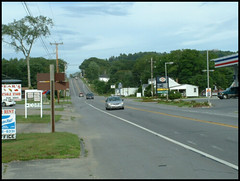Warning: black helicopters on the horizon (or so they say)

Posted March 23, 2011 at 1:25PM
Today we have a guest post by my friend Lee Epstein, a conservationist, land use planner and attorney in the mid-Atlantic region.
Watch out, the black helicopters are coming! The blue-helmeted UN shock troops are about to surround our little communities and, at gunpoint, force us to…become more sustainable?
I am not making this up. An early March blog post from Ben Shulman of the Congress for the New Urbanism noted that Maine’s “colorful” (my adjective) new Governor, Paul LePage, recently cancelled a five-year regional planning effort – some of which is now in its implementation phase -- undertaken with and by a slew of coastal towns. The effort, known as “Gateway 1” for the famous US road that runs through mid-coast Maine (photo), was a locally organized, state-assisted collaboration aimed at creating sustainable approaches and context-sensitive solutions to local economic development and transportation problems. It previously had the full support of the state’s Department of Transportation, and was by all accounts a cooperative project involving state, regional, and local governments and citizens.
This past December, it had won a US EPA Smart Growth Award. Counter-intuitively, that may be why the governor, abruptly and without warning, pulled the plug in early March.  According to the blog, some of the governor’s supporters had conceptually linked Gateway 1 with the United Nations’ sustainability agenda, and feared it would control property rights.
According to the blog, some of the governor’s supporters had conceptually linked Gateway 1 with the United Nations’ sustainability agenda, and feared it would control property rights.
Is this total wackiness what we’re now up against? Has tea party fever loosed every marginal “thinker” and social activist into state and local as well as national politics? Has it finally launched such profoundly nutty ideas into political legitimacy? After all, the majority of the US House of Representatives now doesn’t think climate change is happening, or if it is, humans didn’t cause or aren’t exacerbating it, or if we did, what’s wrong with a little warmer winter in Fargo? Haven’t the new governors of several states (which previously had spent years closely developing the idea of new high-speed rail systems to serve medium-haul transportation needs for which highways or airplanes are extremely inefficient) recently cancelled their state’s participation in such efforts?
Responding to either well articulated arguments or those based on “facts” and statistics that beg for clarification and correction is part of what we need to do. But how does one respond to illogical, unsupported, and frankly off-the-wall critiques?
Ironically, for the first time in nearly a generation, the federal government seems to understand the principles of both sustainability and smart growth, and has taken steps to integrate these concepts into how it operates and what it supports with technical assistance and seed monies. It has also put its own capital development muscle behind them.
With respect to technical assistance and seed money, the combined sustainability initiatives of three federal agencies that can have substantial influence over the future of smart growth and sustainability (the federal Environmental Protection Agency, Department of Housing and Urban Development, and the Department of Transportation), has the potential to move the needle in a very positive way in growing metropolitan regions across the country. With respect to capital development, the US General Services Administration (the government's property manager and the largest owner and developer of real estate in the country) now understands smart growth and sustainability and is beginning to incorporate the concepts into how (and importantly, where) it builds federal facilities.
But the crack and whump of falling federal sustainability initiatives could become loud and clear, as federal budgets succumb not to a surgical or even logical trimming, but rather to an ideological force majeure whose purpose is only incidentally related to reducing the federal deficit. More directly, the effort is related to chopping away programs and policies deemed impure by new federal policy police who, again, attribute many of them to a federal government that, in their view, is much too interested in so-called “social engineering” (i.e., using both policy and funding incentives and disincentives to achieve a positive social result – which, last time I looked, except for defense, pretty much defines the legitimate role of government). All the above-noted programs and policies are on the chopping block.
The smart growth and sustainability movement is up against something right now that is illogical and a little bit crazy, but powerful in its simplicity. We’ll weather it. But it’ll take some intestinal fortitude as well as a strong measure of patience, and maybe a level of political involvement that many of us have mostly eschewed in the past.
Move your cursor over the images for credit information.
